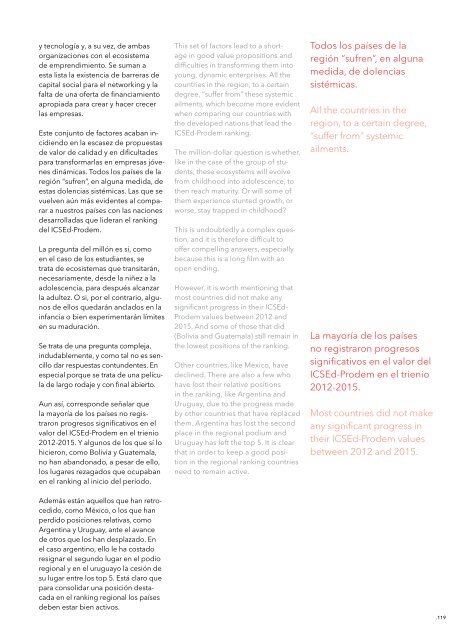Condiciones Sistémicas para el Emprendimiento Dinámico
Informe-2015-11
Informe-2015-11
Create successful ePaper yourself
Turn your PDF publications into a flip-book with our unique Google optimized e-Paper software.
y tecnología y, a su vez, de ambas<br />
organizaciones con <strong>el</strong> ecosistema<br />
de emprendimiento. Se suman a<br />
esta lista la existencia de barreras de<br />
capital social <strong>para</strong> <strong>el</strong> networking y la<br />
falta de una oferta de financiamiento<br />
apropiada <strong>para</strong> crear y hacer crecer<br />
las empresas.<br />
Este conjunto de factores acaban incidiendo<br />
en la escasez de propuestas<br />
de valor de calidad y en dificultades<br />
<strong>para</strong> transformarlas en empresas jóvenes<br />
dinámicas. Todos los países de la<br />
región “sufren”, en alguna medida, de<br />
estas dolencias sistémicas. Las que se<br />
vu<strong>el</strong>ven aún más evidentes al com<strong>para</strong>r<br />
a nuestros países con las naciones<br />
desarrolladas que lideran <strong>el</strong> ranking<br />
d<strong>el</strong> ICSEd-Prodem.<br />
La pregunta d<strong>el</strong> millón es si, como<br />
en <strong>el</strong> caso de los estudiantes, se<br />
trata de ecosistemas que transitarán,<br />
necesariamente, desde la niñez a la<br />
adolescencia, <strong>para</strong> después alcanzar<br />
la adultez. O si, por <strong>el</strong> contrario, algunos<br />
de <strong>el</strong>los quedarán anclados en la<br />
infancia o bien experimentarán límites<br />
en su maduración.<br />
Se trata de una pregunta compleja,<br />
indudablemente, y como tal no es sencillo<br />
dar respuestas contundentes. En<br />
especial porque se trata de una p<strong>el</strong>ícula<br />
de largo rodaje y con final abierto.<br />
Aun así, corresponde señalar que<br />
la mayoría de los países no registraron<br />
progresos significativos en <strong>el</strong><br />
valor d<strong>el</strong> ICSEd-Prodem en <strong>el</strong> trienio<br />
2012-2015. Y algunos de los que sí lo<br />
hicieron, como Bolivia y Guatemala,<br />
no han abandonado, a pesar de <strong>el</strong>lo,<br />
los lugares rezagados que ocupaban<br />
en <strong>el</strong> ranking al inicio d<strong>el</strong> período.<br />
This set of factors lead to a shortage<br />
in good value propositions and<br />
difficulties in transforming them into<br />
young, dynamic enterprises. All the<br />
countries in the region, to a certain<br />
degree, “suffer from” these systemic<br />
ailments, which become more evident<br />
when comparing our countries with<br />
the dev<strong>el</strong>oped nations that lead the<br />
ICSEd-Prodem ranking.<br />
The million-dollar question is whether,<br />
like in the case of the group of students,<br />
these ecosystems will evolve<br />
from childhood into adolescence, to<br />
then reach maturity. Or will some of<br />
them experience stunted growth, or<br />
worse, stay trapped in childhood?<br />
This is undoubtedly a complex question,<br />
and it is therefore difficult to<br />
offer comp<strong>el</strong>ling answers, especially<br />
because this is a long film with an<br />
open ending.<br />
However, it is worth mentioning that<br />
most countries did not make any<br />
significant progress in their ICSEd-<br />
Prodem values between 2012 and<br />
2015. And some of those that did<br />
(Bolivia and Guatemala) still remain in<br />
the lowest positions of the ranking.<br />
Other countries, like Mexico, have<br />
declined. There are also a few who<br />
have lost their r<strong>el</strong>ative positions<br />
in the ranking, like Argentina and<br />
Uruguay, due to the progress made<br />
by other countries that have replaced<br />
them. Argentina has lost the second<br />
place in the regional podium and<br />
Uruguay has left the top 5. It is clear<br />
that in order to keep a good position<br />
in the regional ranking countries<br />
need to remain active.<br />
Todos los países de la<br />
región “sufren”, en alguna<br />
medida, de dolencias<br />
sistémicas.<br />
All the countries in the<br />
region, to a certain degree,<br />
“suffer from” systemic<br />
ailments.<br />
La mayoría de los países<br />
no registraron progresos<br />
significativos en <strong>el</strong> valor d<strong>el</strong><br />
ICSEd-Prodem en <strong>el</strong> trienio<br />
2012-2015.<br />
Most countries did not make<br />
any significant progress in<br />
their ICSEd-Prodem values<br />
between 2012 and 2015.<br />
Además están aqu<strong>el</strong>los que han retrocedido,<br />
como México, o los que han<br />
perdido posiciones r<strong>el</strong>ativas, como<br />
Argentina y Uruguay, ante <strong>el</strong> avance<br />
de otros que los han desplazado. En<br />
<strong>el</strong> caso argentino, <strong>el</strong>lo le ha costado<br />
resignar <strong>el</strong> segundo lugar en <strong>el</strong> podio<br />
regional y en <strong>el</strong> uruguayo la cesión de<br />
su lugar entre los top 5. Está claro que<br />
<strong>para</strong> consolidar una posición destacada<br />
en <strong>el</strong> ranking regional los países<br />
deben estar bien activos.<br />
.119


